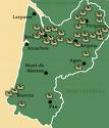Henri de Bonneval 1806 - 1882
September 23, 2007
 Count
Henri de Bonneval (1806-1882), practitioner of homeopathy, agronomist
and
philanthropist
Count
Henri de Bonneval (1806-1882), practitioner of homeopathy, agronomist
and
philanthropist
He was assistant manager of the Strasbourg stud farm in 1830, when Louis-Philippe, an Orleanist, ascended to the throne of the Bourbon Charles X. As several other legitimists, Count Henri refused to take an oath to the new king and prefered to resign his position.
Interested in medicine, he was deeply impressed by Hahnemann’s Organon der Heilkunst and decided to leave France for KOthen, in Saxony, in order to learn homeopathy directly from its founder Back to France, he defended in Montpellier the first French medical thesis devoted to homeopathy and then opened a consulting room in Bordeaux. He rapidly gained a solid reputation and a large audience as a practitioner of homeopathy.
At the same time, Henri acquired the Chateau de Latresne and the 500 acres surrounding land. He renovated and brought up to date the agricultural and wine-producing activities of the estate. The medical doctor soon proved to be an expert agronomist, extending his competence to the famous vineyard Chateau Canon of St. Emilion.
Throughout his life, the Count showed notable qualities of philanthropy, materialized at Latresne by the construction of a church and, adjacent to the chapel, a boarding school, two classrooms and shelters for poor or sick old people. At the end of his life, Henri de Bonneval wrote a comprehensive book, that includes the presentation and discussions of the homeopathic methods, some philosophical reflections and personal memories.